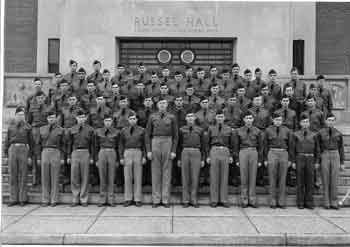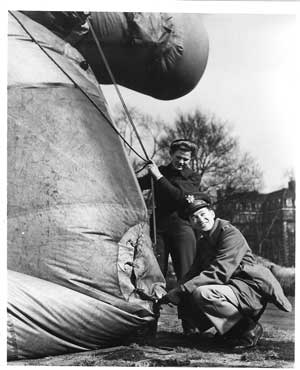Isaac S. Blonder ETG 6
My formative years were those of the Great Depression, 20's and 30's. An education was the universal key out of poverty and I was able to major in Physics up to the Master's degree.
My principal source of funds was as a part-time, self-employed radio serviceman, as well as occasional stints in radio factories.
By 1941, the obvious threat of another World War, comparable to World
War I, had compelled the U.S. to rearm, initiate the draft, and to choose sides. However, the overwhelming urge to avoid being drawn into another European cauldron, coupled with the significant numbers of
citizens from all sections of Europe, meant that no agreement could be reached on what our role should be.
President Roosevelt's instinct was to support Britain and its allies, but lacking a declaration of
war by the Congress, he was limited to minor acts such as the Lend-Lease of 50 old (!) destroyers. Unknown to the public, he also promised Churchill 1000 engineering/physics educated officers to supplement the
critical lack of radar (radio location) personnel engaged in the defense of Britain against German bombers.
Thus, all young science graduates, subject to the draft like myself, were contacted with the offer
of a year's service, to do technical research while clad in an officer's uniform. I signed on, proceeded to Ft. Monmouth, N.J. (before Pearl Harbor), and then learned the 'rest of the story' -
we were scheduled to enter a war zone, disguised as civilians, and upon arrival, transformed into soldiers, on detached duty with the British Armed Forces.
The appellation 'Electronics Training Group' was
applied, both to the overall structure targeted to supply technical officers for training and service in Great Britain, and the individual formations of approximately 50 men sent overseas each month. I was assigned
to Group 6.

(click imager for larger picture and roster)
My time in the military began on 17 Nov. 1941, and lasted until the 26th Feb. 1946. The UK adventure took place from 12 Jan 1942 to the 4th Nov 1942.
Group 6 traveled to Glasgow on the
H.M.T. "Stratheden", arriving on 20 Jan 1942. A small number of us were assigned to the R. A. O. C. radio location school in Richmond, Surrey. The British school routine is radically different from the
American practice. Also, and not inconsequentially, the classroom and living quarters temperatures were around 20 degrees lower than ours. Our attention and study times were definitely affected
adversely! Obviously, I am going to confess that our grades were inferior to our British classmates, even though we had a science degree and they mostly possessed a classical diploma. In our system, we are
expected to challenge the accuracy and usefulness of the teacher's presentation. In the UK, the knowledge is imparted from the oracles and must be repeated at exam time, in full length and unchanged in intellectual
content. Not withstanding, the instruction and the instructors were of very high quality, and we freely expressed our gratitude at being able to attend a superior institute of learning.
Following the school
phase of our radar training, I was assigned to the REME Bristol 8th Division, serving with anti- aircraft gun companies located in southern Cornwall.The term of my duty there was from 12 May
to 17 Sept. . The gunsites were widely separated and I was assigned a batman-driver and an Austin wagon to enable the discharge of my duties at all hours, night or day. The sites were usually in open fields, although near their respective towns, Mylor, Kirketh, Truro, St. Just,and Predannock. For the first time since I enlisted, I was in a real operating military organization solely devoted to winning the war. Equipment had to work or else! An experienced radio repairman like myself had no trouble getting the radars to work, the real problems were a lack of spare parts. Some items I could work my radio spell upon and return to duty, but a shattered vacuum tube is beyond salvage. It turned out that a considerable number of outages was due to following the official maintenance schedule, which required removing items from the radar and testing them according to rigidly prescribed methods. Assembling and disassembling always resulted in breakage, even under my tender touch. Thus, I rewrote the official maintenance manual into one that monitored the performance, in situ, which I believed to be just as reliable in predicting performance, but without the attendant breakage. Soon thereafter, REME called a general meeting of their officers in Plymouth. After a long period of official business the commanding officer intended to close the session with a perfunctory, "any questions, gentlemen". I stood up, clutching my precious document, and proceeded to extol the virtues of replacing the official maintenance manual with mine. There was a period of silence and the meeting was officially closed. I was later gently informed that documents were distributed from the top, not the bottom, period!

(from a photo spread in LIFE, 1941. Inspecting a
barrage balloon, shot by Oswald Wild)
Cornwall was hardly a hardship post. Clotted cream and Cornish ham, together with fresh farm produce, furnished some of the best meals in local pubs to be found in the UK.
After the war I toured Cornwall twice, the radar sites had vanished, but the food tasted just as good as before.
A general word of praise for the British spirit in time of war. I had the opportunity many,
many times to meet with all members of British society from farmhands to nobility, and I never encountered a word of complaint over the hardships every one endured. That was a noble period in the history of mankind
and I trust it will continue to flourish.
Questions on this web site? contact webmaster@blonder.com